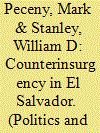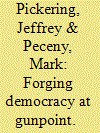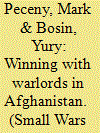|
|
|
Sort Order |
|
|
|
Items / Page
|
|
|
|
|
|
|
| Srl | Item |
| 1 |
ID:
094748


|
|
|
|
|
| Publication |
2010.
|
| Summary/Abstract |
Contemporary U.S. policy makers often characterize the U.S. counterinsurgency experience in El Salvador as a successful model to be followed in other contexts. This article argues that these characterizations significantly overstate the positive lessons of El Salvador, and ignore important cautionary implications. During the first part of the conflict, neither the Armed Forces of El Salvador (FAES) nor the U.S. followed the tenets of counterinsurgency doctrine. The FAES killed tens of thousands of non-combatants in 1979 and 1980, before the civil war even began. This repression may have preempted an incipient popular insurrection, but it also locked in a determined social base that enabled the armed left to build a highly effective and sustained insurgency. In 1984, the U.S. had to save the FAES from likely defeat through a major increase in military aid, especially airpower. When the Farabundo Martí National Liberation Front (FMLN) switched to a classical guerrilla strategy, the FAES, despite considerable U.S. aid, seldom followed best practices in counterinsurgency. Democratization and redistributional reforms were partial and flawed in implementation. The war settled into a stalemate that would likely have continued indefinitely had it not been for the collapse of the socialist bloc and significant changes in the interests of Salvadoran elites that were largely incidental to U.S. policies.The most important cautionary lesson is that indiscriminate violence against civilians early in a conflict can create dynamics that are very difficult to overcome in subsequent stages.
|
|
|
|
|
|
|
|
|
|
|
|
|
|
|
|
| 2 |
ID:
073547


|
|
|
|
|
| Publication |
2006.
|
| Summary/Abstract |
Can liberal interventionism build liberal democracy? This manuscript examines the military interventions undertaken by the U.S., U.K., France, and the UN in the post-World War II era to see if they had a positive impact on democracy in target countries. Empirical analysis centers on multivariate time series, cross section PCSE and relogit regressions of political liberalization and democratization from 1946 to 1996. The former is operationalized with annual difference data drawn from the Polity IV data collection, whereas the latter is a binary variable denoting countries that cross a threshold commonly used to indicate the establishment of democratic institutions. An updated version of the International Military Intervention data set enumerates foreign military interventions. We find little evidence that military intervention by liberal states helps to foster democracy in target countries. Although a few states have democratized in the wake of hostile U.S. military interventions, the small number of cases involved makes it difficult to draw generalizable conclusions from the U.S. record. We find stronger evidence, however, that supportive interventions by the UN's "Blue Helmets" can help to democratize target states.
|
|
|
|
|
|
|
|
|
|
|
|
|
|
|
|
| 3 |
ID:
107899


|
|
|
|
|
| Publication |
2011.
|
| Summary/Abstract |
A fundamental contradiction has been built into America's intervention in Afghanistan since the first days of the war in 2001. On the one hand, US policymakers have viewed the promotion of liberal democracy, economic development, and strong centralized state institutions as essential to achieve victory over the long term. On the other hand, however, the US has relied on local warlords to win its battles against the Taliban from the first days of the intervention. The Obama administration's tortured policy review reflects the intractable dilemmas involved in trying to build a modern democratic state while relying on local warlords as crucial allies in the war against the Taliban.
|
|
|
|
|
|
|
|
|
|
|
|
|
|
|
|
|
|
|
|
|